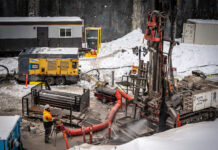Ottawa Construction News staff writer
The new rules requiring mandatory Workplace Safety and Insurance Board coverage, implemented Jan. 1, have stirred controversy within the industry – with strong support form the unionized sector and absolute dismay and anger among non-union contractors.
The new rules, requiring virtually every independent contractor and owners/office staff of construction businesses to have WSIB coverage, is an important component in combatting the pervasive underground economy, says the Ontario Construction Secretariat (OCS), representing unionized contractors and construction trade unions.
Meanwhile, Juliette Forgues, a controller at Les Fondations Brisson Inc., told the Daily Commercial News that hundreds of construction workers were expected to unite in a January meeting in Cassleman against the mandatory WSIB coverage
“We hope to change the law because nobody is anxious to pay that extra money and give it to the WSIB. Nothing will be changed tonight, that will be a process, but we will start tonight.” she told the Toronto-based publication. “If everybody is there and we’ve got the support, after that we’ll do something bigger.”
“Before mandatory WSIB coverage, many Ontario construction workers were able to not only evade their taxes which fund important public services, but to also avoid making contributions to the funds that compensate injured workers,” says Sean Strickland, the OCS’s chief executive officer .“By closing this loophole, the government has taken an important step in prohibiting the underground economy in Ontario construction.”
The OCS says in a news release it has conducted several studies on the underground construction economy in response to growing concerns expressed by contractors and construction unions.
The union/management secretariat says that these studies provide evidence that:
- Underground construction activity amounts to between $1.4 billion to $2.4 billion in evaded taxes and WSIB fees, funds that are being siphoned away from public services at hospitals, schools, and injured workers’ medical expenses;
- Classing employees as ‘independent operators’ provides contractors with an unfair and illegitimate competitive advantage ranging from 20% to 50% of labour costs; and
- The underground economy undermines the coverage of benefit plans and weakens support for apprenticeship and training. By shifting costs onto others, the underground economy increases the operating costs of workers and contractors who follow the rules.
However, many employers and independent contractors disagree with this interpretation. They point out that it is unreasonable to expect office-based staff to pay WSIB premiums at the full risk rate for construction workers, and the new rules may in fact aggravate the underground economy as more contractors slip under the table to avoid the new rules.
As premium rates are higher once there is a claim, Forgues told the DCN that “no independent operator or partners or executive officers will claim to the WSIB that will affect their own company. The WSIB won’t pay anything to those contractors.
“It’s really a cash grab,” she is quoted as saying.
The WSIB has developed a website to provide information for construction employers on mandatory coverage: BeRegisteredBeReady.ca.







